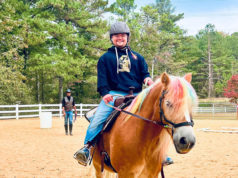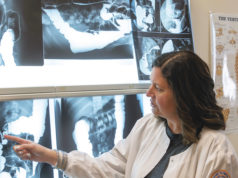VRS connects individuals across northwest Georgia with vision impairment resources and tools
By Lindsay Field Penticuff
Imagine losing your sight and thinking you’ll never be able to read again, use your computer again, or drive again. It may sound unlikely, but individuals who are visually impaired — and for whom there’s no way of ever regaining their sight — face these challenges every single day. This is where Katherine “Kay” Eller and her team at Vision Rehabilitation Services (VRS) of Georgia Inc., come in with a helping hand and some incredible resources and tools for individuals who are visually impaired.
VRS was founded 38 years ago in Smyrna by the late Sarah Frances Sentell Scott. While in her 40s, she began to lose her sight and had trouble finding accessible options for assistance, as the closest help was in downtown Atlanta. With support from friends and her church family, Scott established Cobb Services for the Blind, which is now known as VRS and serves between 350 and 500 people annually from 34 counties across north/northwest Georgia.
“We train and assist individuals living with low vision or blindness so that they can function independently in all environments, from work, school, to home and in our community,” says Eller, who serves as executive director of VRS and was first introduced to the organization in 2006, when she helped raise money for the non-profit. “In order to receive our services, you have to have a condition that can’t be corrected with surgery or medication.”
With support from VRS, individuals are learning how to do things differently, using what little vision they have left or without any sight.
They offer:
- Vision rehabilitation therapy (VRT)
- Technology access training (TAT)
- Orientation and mobility (O&M)
- Low Vision Evaluations
- Personal adjustment to vision loss counseling (PAC)
- Support groups
- Job readiness training
- School support in 11 districts across Atlanta
- Services through Georgia Vocational Rehabilitation Agency (GVRA) as a vendor
- Services through Project Independence, a vision program for those age 55 and older administered through GVRA
Through each of these programs, VRS is able to support individuals living with vision impairments in ways that these folks may not get help otherwise. The VRS team understands how frustrating it can be for someone to lose their sight, and they are on hand to offer an abundance of services to support a person’s greatest needs.
Current clients range in age from 3 to 104, and some of the more common visual impairments among the clients are macular degeneration and retinitis pigmentosis, both degenerative eye diseases with vision loss occurring over time. “Another is diabetic retinopathy, which is when uncontrolled diabetes can impact someone’s vision,” says Eller. Because of this eye condition, VRS is planning to restart its Diabetes Education Program. This is a six-week curriculum in which they teach individuals how to eat correctly, to exercise, and how to manage their diabetes with low vision. Eller says their goal is to open the program up to anyone with diabetes in an effort to prevent diabetic retinopathy.
Maintaining your eye health
With May being Healthy Vision Month and June being Child Vision Awareness Month, there’s no better time than now to learn how to maintain your eye health. “One of the biggest things is eating healthy and managing your diabetes, because diabetic retinopathy is actually the number one disease causing blindness,” shares Eller. “Also, always wear sunglasses, and the earlier you start your children wearing sunglasses, the better. People don’t think about covering a baby’s eyes, but it’s important to block out the rays of the sun so that they don’t burn out retinas.”
Eller also recommends following the 20/20/20 Rule. “Your eye is a muscle, and it’s a muscle that needs exercise and to relax, just like any other muscle,” she says, “so it’s highly suggested — because of the way we are constantly reading smartphones, tablets, and computers and the impact of blue light — that every 20 minutes, we look at something 20 feet away for 20 seconds.”
It’s also important to make sure children are screened annually. Many pediatricians will perform an eye exam during your child’s annual checkups. Due to COVID-19, in-school screening won’t take place in the Cobb County School District during 2021-22, so parents are encouraged to contact their local Lions Club for a vision screening event. If you can’t afford the eye exam and glasses, the club can help with costs in many cases.
And if you’re already experiencing vision concerns, VRS offers low-vision exams at their Smyrna location twice a month, and they often travel, packing up the clinic and hitting locations across the area about once a quarter. One of their contracted doctors, who are specially trained in low vision, will evaluate clients to outline a proper training program. “There’s no dilating of the eyes or ‘poking around’ the eyes during low vision exams. They will identify proper devices, such as magnifiers, bioptic spectacles, glare-control glasses, suggest lighting, assistive technology, and other services to support our clients,” Eller says.
It’s all about the people
Since being established almost 40 years ago, VRS has meant so much to the individuals and families supported by the organization. For Lisa Sunday, VRS was the answer her family was searching for after her grandmother was diagnosed with macular degeneration. “Mrs. Scott used to come into the bank [where I work], and one day I told her about my grandmother having a hard time reading and asked if she had anything that could help her,” recalls Sunday, senior VP at CenterState Bank/SouthState Bank in Smyrna. “That’s when we learned about some of the incredible tools they offer the visually impaired.”
Her grandmother used a lighted device that she could attach to her books to help magnify the copy so that she could read. It made reading her Bible and mail much easier again. Because of the assistance Sunday’s grandmother received, she has continued to support VRS for nearly 30 years now. “The thought of coping without your sight is just unimaginable to me,” Sunday adds. “I can’t fathom not having my sight. I think it’s so important for anyone who has a history or any eye issues to take care of your sight and take care of their vision as best as you can.”
Jessica Wilson, a patient at VRS who was born with albinism and has been visually impaired for as long as she can remember, is incredibly grateful for the support she’s received through the years. “One of my goals was being able to drive,” she shares. “I wanted to carve out my own path in life and live as independently as possible.”
Wilson received the educational assistance she needed through school programs and community resources for the visually impaired in metro Atlanta, but she was connected with VRS in 2008 and underwent a low-vision exam with one of their doctors. VRS developed a customized plan for Wilson with practical tools for independent living. They also fitted her for bioptic lenses, which are miniature telescopes mounted to the top of her eyeglasses. As a result, she was able to get her driver’s license, giving her more freedom than ever before. “VRS opened my eyes to what’s possible and have supported me all along the way,” says Wilson.
Joe Dora shares the same sentiment. The 95-year-old World War II veteran leaned on VRS after he was diagnosed with macular degeneration and relocated from Massachusetts to Georgia to be closer to family. “Joe was referred to us through the VA,” Eller says, “and it was clear to us from the onset that he was eager to use all the technology we had to offer to help him adjust to vision loss.”
Following his low-vision evaluation, Dora learned viewing techniques that he could immediately use to help him use the vision he had. Then, he met with VRS technology instructors who showed him how to stay connected with the world with his iPhone and iPad. And the purchase of a hand-held magnifier quickly enhanced his ability to read.
But Dora didn’t stop there. He has installed and learned how to use mobile apps to help him with day-to-day living, such as finding online articles and tuning into his favorite radio stations broadcasting from Massachusetts. “You have to stay interested and engaged with life,” Dora adds. “You’ll find that there are tools and resources that will keep you active and involved. And VRS will help you find them.”
VRS Fundraisers
If someone loses their vision, they typically only receive minimal healthcare coverage to help pay for impairment support. This is why the annual fundraisers hosted by VRS are so important.
13th Annual Spooktacular Chase
Event includes 5K, 10K, and Kids Creepy Crawl.
When: Saturday, Oct. 23
Where: Thurman Springs Park, Powder Springs
Register: https://tinyurl.com/2021spooktacularchase
Inaugural Golf Tournament
Visually impaired golfers from Georgia Blind Sports are partnering with VRS for the event.
When: Monday, Sept. 27
Where: Pinetree Country Club, Kennesaw
Register: https://birdease.com/vrsga
Is my child having vision problems?
If you are concerned about your child’s vision, pay attention to whether he/she is:
- Moving closer to the TV.
- Holding an iPad, cell phone, or devices close to their face.
- Leaning over schoolwork at the table or desk.
- Leaving a mess after being asked to clean up (more than just being lazy, as it’s apparent they can’t see what was missed).
- Rubbing their eyes a lot, especially pay attention to small children who can’t tell you what’s wrong.
- Developing at the suggested rate for his age, according to research and developmental schedule from a pediatrician.




